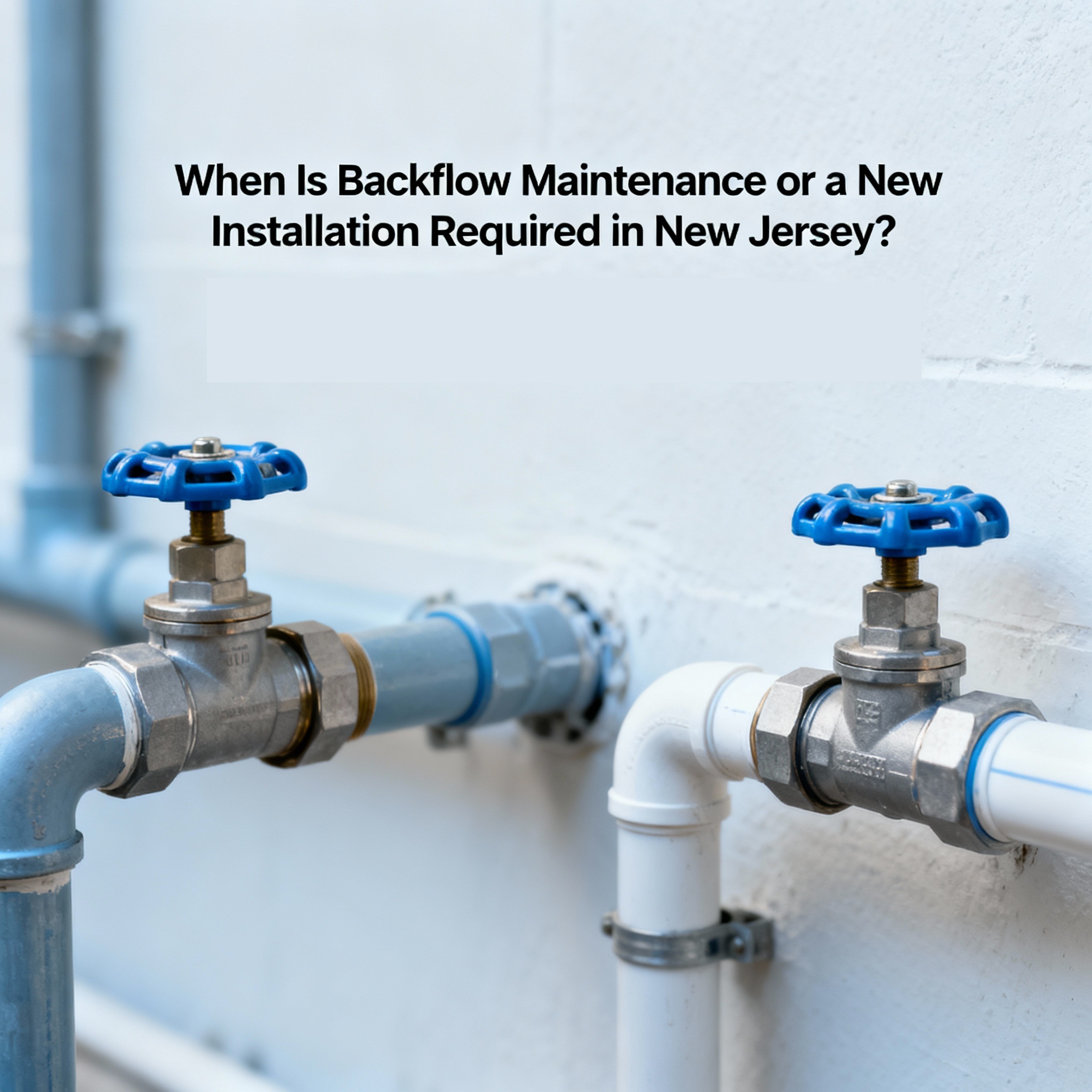When Is Backflow Maintenance or a New Installation Required in New Jersey?

Backflow prevention may not be something most homeowners or business owners think about—until there’s a problem. But in New Jersey, backflow testing, maintenance, and proper installation are not just important—they’re required by law in many cases.
Whether you manage a commercial property, operate an irrigation system, or simply own a home with certain plumbing setups, knowing when backflow maintenance or a new installation is required is critical to protecting your water supply—and staying compliant with NJ regulations.
In this post, we’ll break down:
-
What backflow is
-
Why it’s dangerous
-
When maintenance is necessary
-
When a new installation is required
-
And how to stay compliant with NJ local water authorities
What Is Backflow?
Backflow occurs when water flows in the reverse direction in your plumbing system—pulling contaminated or used water back into the clean water supply. This can happen due to backpressure (from a pump or elevation) or back-siphonage (from a sudden drop in pressure).
Common sources of backflow include:
-
Lawn irrigation systems
-
Fire sprinkler systems
-
Boilers
-
Hose bibs (outdoor spigots)
-
Commercial equipment tied into water systems
Why Backflow Prevention Matters
Without a backflow prevention device, dirty or hazardous water can contaminate your home’s or even your city’s drinking water. Contaminants can include:
-
Fertilizers and pesticides (from irrigation systems)
-
Cleaning chemicals
-
Fecal matter
-
Industrial waste
In New Jersey, backflow prevention is mandated under the NJ Safe Drinking Water Act, and local water purveyors are tasked with ensuring businesses and homeowners are compliant.
When Is Backflow Maintenance Required in NJ?
Backflow prevention assemblies (like RPZ valves or double-check valves) require annual testing and maintenance to ensure they are working properly.
You’re typically required to schedule maintenance and testing when:
✅ You Own a Property with an Existing Backflow Device
Most irrigation systems, commercial plumbing, and multi-unit buildings will have backflow devices installed. If so, NJ law requires annual testing by a certified backflow tester.
✅ You Receive a Notice from Your Local Water Authority
Water suppliers routinely send out compliance notices reminding property owners to test and maintain their backflow devices. Ignoring these notices can result in fines or water service shutoffs.
✅ You Notice Performance Issues
Signs of backflow system failure might include:
-
Low water pressure
-
Discolored water
-
Leaks around the valve
-
Noticeable taste or odor in water
In these cases, immediate maintenance or repairs are necessary.
When Is a New Backflow Installation Required?
You will likely need to install a new backflow prevention device in the following situations:
🔧 1. New Irrigation System Installation
If you’re installing a lawn sprinkler system, NJ building codes require a backflow preventer to be installed and tested before the system can be used.
🔧 2. New Construction or Major Plumbing Renovation
Any major plumbing addition—especially in commercial buildings—may trigger the need for a new backflow device, especially when water is used in ways that could cause contamination.
🔧 3. Failed Annual Test
If your current device fails the annual backflow test and cannot be repaired or rebuilt, replacement is required.
🔧 4. Upgrading to Comply With New Regulations
Municipalities may require upgrading from a double-check valve to a more robust reduced pressure zone (RPZ) device if contamination risks increase or standards change.
🔧 5. Change in Water Use Classification
If a property changes use (e.g., from residential to commercial or adds a salon, lab, or industrial process), the risk of contamination increases, and upgraded backflow protection may be mandated.
NJ Backflow Installation & Maintenance Laws: Quick Overview
-
Annual testing is required in most municipalities for commercial and irrigation systems.
-
Only licensed backflow testers can perform official inspections.
-
Test results must be submitted to your local water authority.
-
Fines or water shutoff can result from non-compliance.
-
Fire systems, irrigation, pools, boilers, and chemical equipment often require permanent backflow protection.
How to Stay Compliant (and Safe)
Here’s how to stay ahead of issues and avoid costly penalties:
✔ Schedule annual backflow testing
Use a certified backflow prevention technician to inspect and report to your utility company.
✔ Replace faulty or outdated valves
Don’t risk failure—older backflow preventers should be replaced if parts are no longer available or repairs are ineffective.
✔ Keep clear records
Save inspection certificates and submit test results promptly.
✔ Install new devices when required
If you’re expanding irrigation or plumbing systems, talk to a licensed plumber or backflow specialist before starting.
Need Help with Backflow Testing or Installation in NJ?
Whether you’re in Middlesex, Monmouth, Ocean, or another NJ county, we offer:
-
Certified backflow testing
-
Maintenance & repairs
-
Backflow device replacement
-
New installations for irrigation, pools, boilers, & commercial plumbing
-
Fast documentation & local reporting
-
Competitive pricing with reliable service
Schedule your backflow test or get a free estimate for a new installation today!
📞 Call us at 732-735-9318
🌐 Visit https://www.smartwaterbackflow.com/
Final Thoughts
Backflow issues can compromise more than just your plumbing—they can threaten health and safety. If you’re unsure whether you need maintenance or a new backflow device installed in New Jersey, start with a quick consultation. It’s one of the simplest ways to stay protected, stay compliant, and keep your water clean.
Leave a Reply